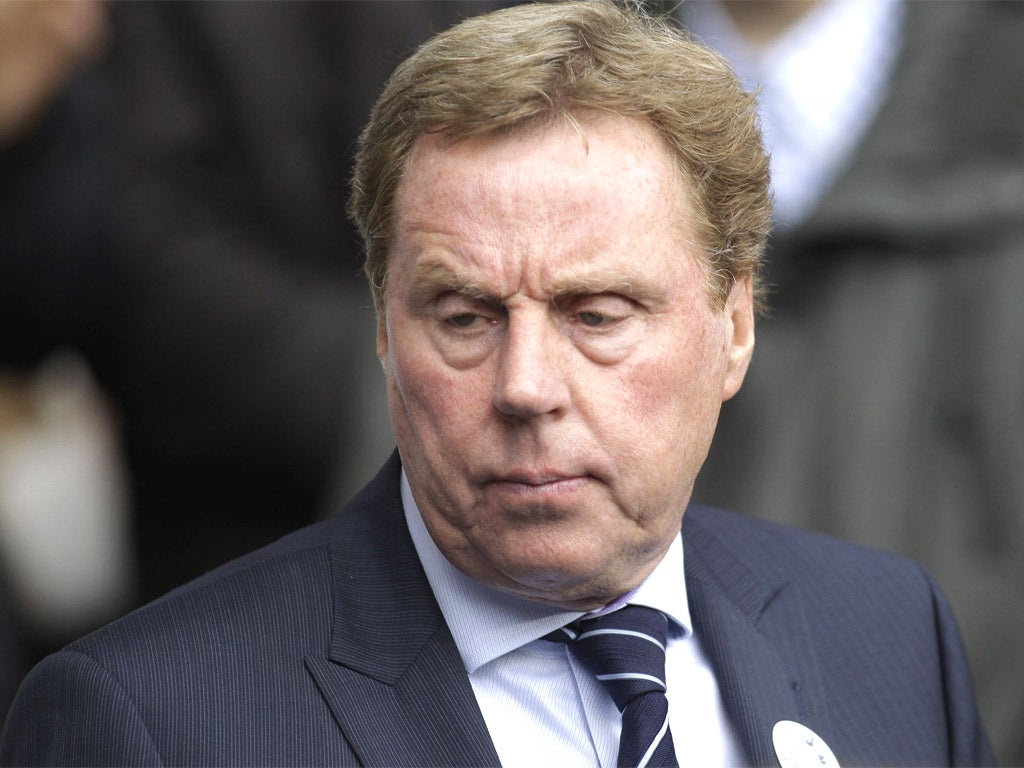Jack Pitt-Brooke: Harry Redknapp tumbles at Tottenham just months after reigning supreme
Spurs manager left in a weak position by their failure to qualify for the Champions League

Your support helps us to tell the story
From reproductive rights to climate change to Big Tech, The Independent is on the ground when the story is developing. Whether it's investigating the financials of Elon Musk's pro-Trump PAC or producing our latest documentary, 'The A Word', which shines a light on the American women fighting for reproductive rights, we know how important it is to parse out the facts from the messaging.
At such a critical moment in US history, we need reporters on the ground. Your donation allows us to keep sending journalists to speak to both sides of the story.
The Independent is trusted by Americans across the entire political spectrum. And unlike many other quality news outlets, we choose not to lock Americans out of our reporting and analysis with paywalls. We believe quality journalism should be available to everyone, paid for by those who can afford it.
Your support makes all the difference.From two points in eight games to fourth place and the exit door; the Harry Redknapp era at Tottenham has been defined by friction, dynamism, and the overwhelming football force of momentum.
As recently as this January he was hailing the greatest Tottenham team of his generation, presiding over the best attacking football in England, breathing on the necks of the Manchester clubs, and enjoying a higher profile than any English manager since Kevin Keegan. To suggest than that he would leave like this was absurd.
In mid-January Redknapp said that his team, comfortably third in the Premier League, would have beaten the great Tottenham side of 20 years before, which won the 1991 FA Cup. "They had a few special players: Gazza, Gary Lineker, and Gary Mabbutt was a good player," Redknapp reflected. "But you'd fancy this team would be stronger than that now."
There was not much dissent. In the autumn Tottenham won 10 out of 11 league games. They were the only unbeaten team over the Christmas period. They were, unambiguously, the best team outside Manchester.
But the drama of Redknapp's rise could not be sustained. And the day when he reached the peak of his profile also unleashed the forces which brought him down. On the morning of 8 February Redknapp was acquitted of charges of tax evasion. That evening, Fabio Capello resigned as England manager. Redknapp started the day in the dock, and ended it on top of the football world.
Redknapp was favourite for the England job, with the bookmakers, the players and fans. Three days later Spurs eviscerated Newcastle United 5-0, while the fans at White Hart Lane implored him not to take up the anticipated offer.
The presumption was that Redknapp would be offered the job, and would take it. He did not loudly distance himself from it. In Spurs' next game, at Arsenal, Tottenham raced into a 2-0 lead. This would have given them a 13-point margin over their local rivals, and set Redknapp up to beat his 2009-10 finish and go straight into the group stages of the Champions League.
But it did not go that way. Tottenham collapsed, Arsenal won 5-2 and the spiral began. Spurs won one of their next eight league games. Redknapp denied that the England speculation made a difference, but the players' performance suggested otherwise. The possibility that Redknapp might not be there beyond the summer appeared to distract them. "That is the biggest load of nonsense I've ever heard in my life", Redknapp said, when asked about it.
As Spurs' form fell away so did their hopes of a title challenge, and then a procession into third, and then an FA Cup final. Many held Redknapp responsible for this, as the team lost focus. By the end of the season, as Spurs fought their way into fourth, there was even a sense that his presumed departure for England might be welcomed.
Of course, frustration with fourth shows just how well Redknapp had done at Tottenham. He inherited a mess from Juande Ramos, and the famous two points from eight games in 2008 was indeed abysmal. Redknapp took them into the Champions League and beat both Milan sides.
Modern club football, though, is all about momentum. And by this spring it felt as if Redknapp's use to Spurs, and their enthusiasm for him, were on the wane. The England link had changed the dynamic. There was no desire to extend his contract far into the future.
"They don't care whether I'm the manager next year, they wouldn't lose any sleep over that or whoever comes," Redknapp said of his players, in March, during the England speculation. "That's football: footballers are footballers, they play the game, they come in every day and train, somebody else comes in the door tomorrow and it's 'the king is dead, long live the king'."
Join our commenting forum
Join thought-provoking conversations, follow other Independent readers and see their replies
Comments